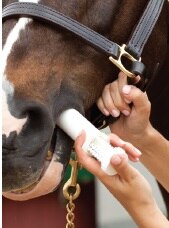Horse Deworming Myths Busted - Facts on Parasite Control

We get a lot of questions about deworming, and often hear horse owners confused by myths and rumors. So we’re clearing the air and demystifying deworming!

Myth #1
“I don’t need to deworm my horse because his fecal always comes back 0/negative.”
Busted! You’re doing a great thing by performing regular fecals on your horse, but it’s critical to realize that a negative fecal egg count test does not mean your horse is parasite-free. Believe it or not, there is little correlation between fecal egg count results and a horse’s parasite load. That means that your horse with a negative fecal still almost assuredly has intestinal parasites—those parasites simply are not actively shedding eggs.
Failing to deworm based on a negative fecal could have serious health consequences. The American Association of Equine Practitioners (AAEP) recommends that even horses with a negative fecal, or those categorized as low shedders, be dewormed 1-2 times annually.
Myth #2
“My horse never leaves the barn, so I don’t need to deworm him.”
Danger! While horses do technically get “infected” with parasites, it doesn’t happen exactly like getting infected with a contagious disease like influenza or rhino (Equine Herpes Virus). With parasites, a horse can re-infect himself with his own intestinal worms (yuck!). So even if you have just one horse that never goes off-site, he could still have quite a parasite load just from the eggs he himself passes and re-ingests.

Myth #3
“Targeted deworming is a ton of work (and expensive!).”
No way! Targeted deworming is actually less work and less expensive and more effective!
Step one is having a fecal performed on your horse. If it comes back less than about 200 eggs per gram (of feces), then your horse is likely a low egg-shedder and only needs to be dewormed twice a year. If the results show more than 500 eggs per gram, then your horse is likely a high egg-shedder and needs to be dewormed more often, maybe four to six times during the grazing season in your area. It’s as simple as that!

Myth #4
“Rotating dewormers every two months prevents resistance and is still the best way to protect against parasites.”
Nope! Of the three chemical classes that horse owners were advised 30 to 40 years ago to rotate between, parasites have become widely resistant to one of them (benzimidazoles), somewhat resistant to another (pyrantel), and are showing emerging resistance to the third (macrocyclic lactones like ivermectin and moxidectin). So when you give a benzimidazole, few if any worms may be killed—you might as well be giving water! Do your horse a favor by only using dewormers that are effective against parasites.
Myth #5
“Horses should be dewormed regularly year-round.”
False!
An expert in parasitology once compared deworming horses to mowing your lawn. In the North, you wouldn’t mow your lawn in January, as the grass doesn’t grow then (plus it’s cold, brr!). And in the South, you wouldn’t cut grass in August because, again, it’s probably not actively growing then. So if you’re in a more northern climate, you may be able to refrain from giving dewormers when parasites aren’t active (winter, your non-grazing season) and vice versa for those in southern climates.
Remember that your veterinarian is your best resource when it comes to making the final call on when it’s best to deworm your horse based on factors like your location, your horse’s shedding status, and others.